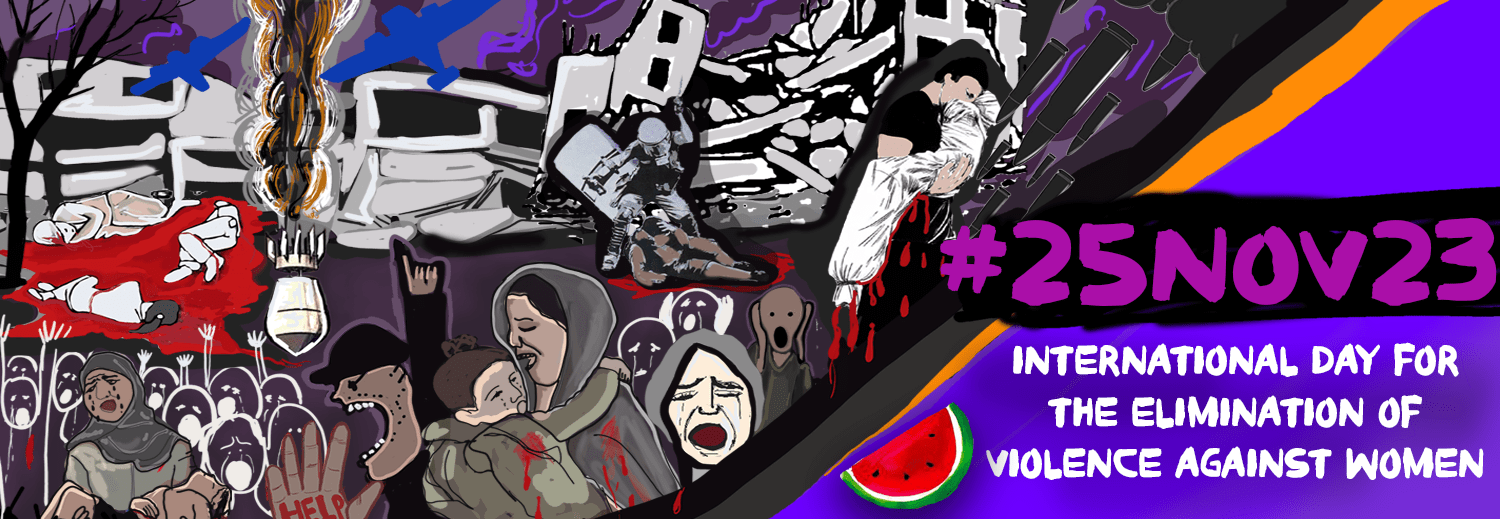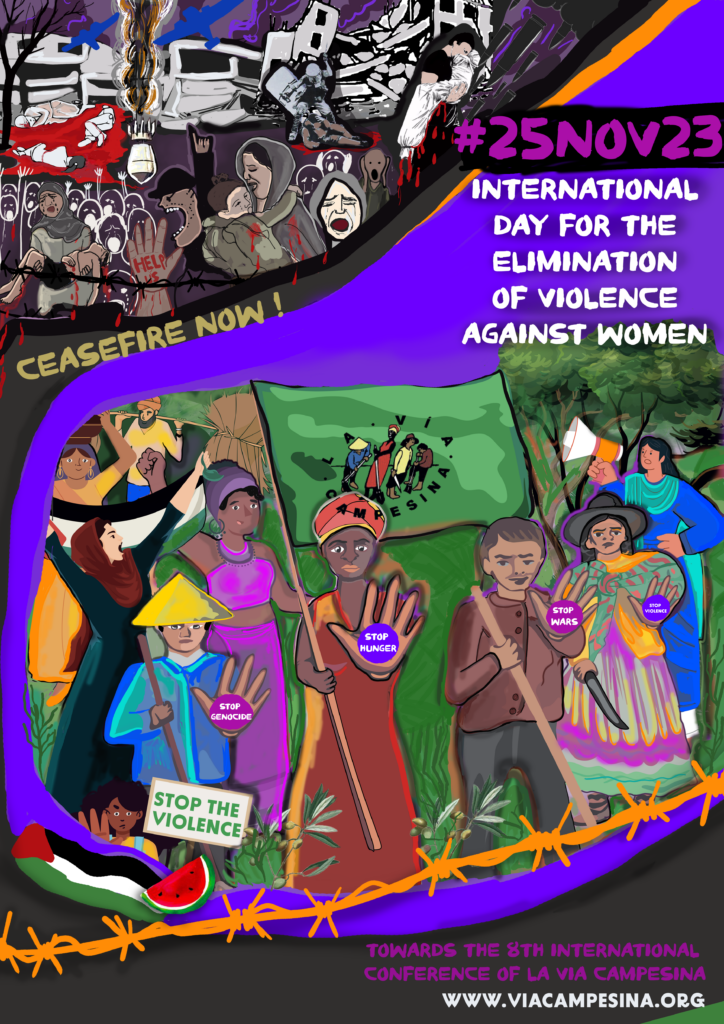#25Nov23 | With conviction, we pave the way for peasant and popular feminism, build Food Sovereignty, and fight against crises and violence

Bagnolet, 10/11/23 | Call to Action – International Day for the Elimination of Violence against Women
On 25 November, the International Day for the Elimination of Violence against Women, La Via Campesina is sounding the alarm about the various forms of violence experienced by women around the world. During crises and violence such as wars, occupations and expulsions from our territories, peasant women, fisherwomen, shepherds, indigenous women, quilombolas and indigenous peoples, landless, migrants and agricultural workers continue to resist in Palestine, Haiti, Cuba, Niger, Peru and other territories around the world, making history in the struggle against capitalism, patriarchy, racism, colonialism and the advance of fascism.
In Palestine, in the span of 25 consecutive days of these attacks against civilians, 8,525 Palestinians have tragically lost their lives, and 67% of the victims were women and children. This has not only resulted in loss of life but has also led to the widespread destruction of numerous homes, hospitals, schools and critical infrastructure, all of which occurred without any prior warning of evacuation. Women enduring the harsh realities of this occupation are forced to live in appalling conditions as they have been forcibly displaced. Among them are pregnant women who need essential medical care and other basic necessities to feed their babies, while enduring the lack of even the most basic standards of living. The Israeli occupation has imposed a total siege, severely limiting access to food, water and fuel for the past three weeks. This siege employs starvation as a cruel and inhumane tactic, causing immense suffering among women who have no safe place to live and provide urgently needed care for their children.
On this day, we denounce the inability of the States to guarantee their commitments in the construction of a public policy of equality, the complicit and patriarchal judicial system that protects aggressors and promotes a culture of impunity and violence against women, girls and diversity.
As Morris Tidball-Binz, UN Special Rapporteur on extrajudicial, summary or arbitrary executions, noted in his 2023 report, “Femicide is a global tragedy of pandemic proportions, with tens of thousands of girls and women, including transgender women, murdered every year because of their gender, and many more at risk of dying from gender-based violence because States don’t fulfil their duty to protect victims’ lives and ensure their safety.”
Since the foundation of our movement, in these 30 years of struggle and organisation, food sovereignty as a political principle has allowed rural women to denounce the capitalist system, the generator of the multiple injustices and inequalities that we are experiencing today, which has turned food into a commodity for agribusiness, putting market interests first, poisoning the soil and threatening the subsistence of humanity and life on the planet.
Rural women are essential in the fight against hunger and in the defence of food sovereignty, in the care of biodiversity, in the recovery of indigenous seeds, in the care of water, soil and ancestral knowledge. At the same time, we are a front of struggle, resistance and resilience in the face of political, economic and environmental crises. Through agroecological practices we ensure the sustainable management of Mother Earth and promote a feminist, supportive and just economy.
At the same time, we denounce the neoliberal and fascist policies on women’s bodies and lives: the lack of fundamental rights such as education, housing, health, sexual and reproductive rights, as well as freedom of mobility, organisation and communication.
The world is currently experiencing a setback and a serious loss of fundamental and historical rights in multiple crises caused by wars, the climate crisis, poverty and pandemics, which have a clear gendered impact and unequally affect women and girls.
Before, during and after the COVID-19 pandemic, as peasant women we have affirmed food sovereignty as a concrete way to face these crises, and we continue to produce more than 70% of the food we represent 50% of the labour power in the field. However, we own less than 2% of the land, infrastructure and necessary services.
In this sense, we see the UN Declaration on the Rights of Peasants, adopted in 2018, as a political tool to defend and fight for our rights, and to guide public policies that guarantee a dignified life in the countryside and healthy food for humanity and life on the planet.

On this day of action #25Nov23, together with organised and rebellious women from all over the world, we will call for a day of mobilisation, training and exchange, with forums, direct actions, fairs and other events denouncing the daily and structural violence that women and peasants experience. We will take to the streets and networks to put forward our political proposals to condemn capitalism, patriarchy, the states and the judiciary as the main accomplices of the violence and crises we are experiencing today.
Towards our 8th Conference and 6th International Women’s Assembly in Bogotá
Since its birth, La Via Campesina has sought to guarantee the participation of rural women at all levels of action, power and representation, in order to build a broad, democratic, international movement, politically and socially committed to the defence of peasant agriculture, food sovereignty, the struggle for land, justice, equality and the fight against all forms of gender violence.
Since the First Conference and the Women’s Assembly of La Via Campesina, we have achieved key objectives such as gender parity, peasant and popular feminism and the fight against violence. We have also gained recognition for our strategic role in food sovereignty and food systems and in the construction of the Declaration of Peasant Rights.
“These spaces are key to talking about the context, the strengthening of the right, fascism and neo-fascism. All this means a lot in the lives of rural women. There is still a lot of political violence, so during the Assembly we have to deal with the causes of this violence. With conviction, as our slogan says, but without fear,” commented Adriana Mezadri of the Brazilian Women’s Peasant Movement and the Women’s Articulation of the South American Region of La Vía Campesina.
The International Women’s Assemblies that have been held during these years, within the framework of our International Conference (1-8 December 2023), give the movement a political base and a horizon, since it is here that the actions for the following period are evaluated and planned. Our 1st Assembly took place in Bangalore, India, in 2000; the 2nd Assembly in Sao Paulo, Brazil, in 2004; the 3rd Assembly in Maputo, Mozambique, in 2008; the 4th Assembly in Jakarta, Indonesia, in 2013; and the 5th International Women’s Assembly in Derio, Basque Country, in 2017.
Petra Ortiz, from the Panamanian Peasant Union of the Central American Region, says that several face-to-face and virtual meetings, schools, gatherings and assemblies have taken place in the run-up to the 6th International Women’s Assembly, which will take place in Bogotá on 2 December.
“We have reviewed the history of articulation, the journey of articulation in La Via Campesina, and the advance of peasant and popular feminism in the search for justice. Also to look inwards and say that there is still violence in organisations, so we are also working on training our colleagues in feminism and new masculinities against all patriarchal practices. We have the challenge of continuing to integrate young people, strengthening solidarity, and migration is also a serious issue in the region and globally, as is the environmental crisis, which is aggravating the situation in the countryside,” she says.
Global Campaign to ‘Stop the Violence Against Women’ – 15 Years of Breaking the Silence
The International Campaign to Stop Violence Against Women is celebrating its 15th anniversary since it was launched at the 5th Conference in Maputo in 2008, where La Via Campesina “broke the silence” and conceived it as a way of dialogue within the movement and with society on the importance of building new and better human relationships as part of the construction of new societies.
Anuka De Silva, from MONLAR Sri Lanka and the Asian continent, says that the peasant population is a large one, with a lot of rural areas and cultures. This region is promoting a campaign against micro-lending, which enslaves peasant women with unpayable bills.
“This is also a form of violence. We want to include it in our campaign, which will celebrate its 15th anniversary at the 8th World Conference. We don’t have land in our patriarchal societies. That’s why we demand changes in the laws and fight for joint ownership.
At the same time, she mentioned the importance of stepping up the campaign against agrochemicals, which are not only related to food. In Asia, they are causing the deaths of women and children. “Migration is also a serious problem in a number of countries in the region. There are no labour rights. We are calling for women and countries to be mobilised for rights. In addition, the environmental crisis has caused floods and droughts, so we demand climate justice and real policies,” she adds.
Food sovereignty cannot be sown with violent and toxic relationships! It also seeks to denounce the violence of agribusiness, which greatly affects rural women, peasants, fishermen, shepherds, landless women, migrants and farm workers, displacing, poisoning, exploiting, criminalising and killing them.
Download our communication materials and campaign poster here.
Follow us on social media using the hashtag: #PopularPeasantFeminism #StopViolenceAgainstWomen #25Nov23 #8ConfLVC
